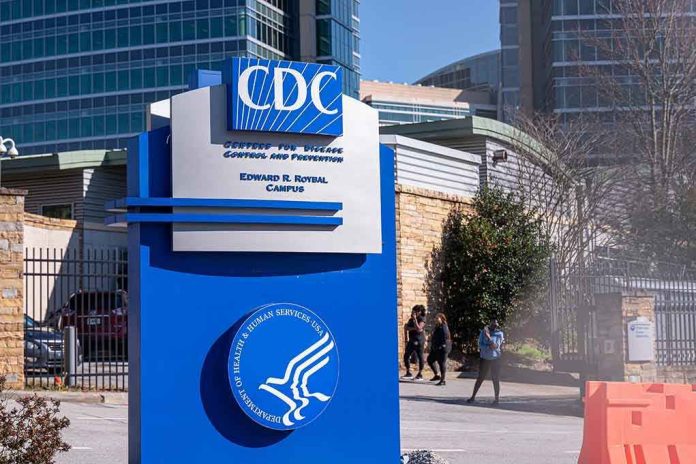
In a stunning move, the CDC faces a federal lawsuit demanding it halt its childhood vaccine schedule until it proves, with rigorous scientific studies, that the cumulative effect of over 70 doses is truly safe for America’s children.
Story Highlights
- Lawsuit filed against CDC alleges lack of comprehensive safety studies for entire childhood vaccine schedule
- Plaintiffs seek immediate changes to national vaccination policy via federal court intervention
- CDC and major medical associations defend current vaccine recommendations as safe and essential
- Case ignites fierce debate over parental rights, government authority, and public health transparency
Lawsuit Directly Challenges CDC Vaccine Policy
On August 19, 2025, a coalition of doctors—including several with suspended licenses—and the advocacy group Stand for Health Freedom filed a lawsuit in federal court targeting the Centers for Disease Control and Prevention (CDC). The plaintiffs argue that the CDC has failed to conduct or publish scientifically rigorous studies assessing the cumulative safety of its recommended childhood vaccination schedule, which now consists of more than 72 doses from birth to age 18. Instead of focusing on individual vaccines, the suit claims broader, long-term effects have not been adequately tested, and seeks a court order to suspend or alter CDC recommendations until such evidence exists.
The CDC updated its Child and Adolescent Immunization Schedule just days before the lawsuit, reaffirming its position that the schedule is safe and effective. However, the agency declined to comment on the pending litigation. This legal challenge stands apart from prior vaccine-related lawsuits, which have mostly targeted individual mandates or specific vaccines. By demanding immediate changes to national health policy through judicial, rather than legislative or regulatory, action, the plaintiffs are raising the stakes for how medical guidelines are set and who holds ultimate authority over children’s health decisions in America.
Core Arguments and Stakeholder Positions
The plaintiffs’ central claim is that parents and children are potentially exposed to unknown risks because the CDC has not undertaken or published comprehensive studies on the safety of the full vaccine schedule administered across childhood. Their legal filing asserts that, absent such data, the CDC’s recommendations lack a sound scientific foundation. The CDC, in contrast, maintains that its guidance is based on decades of clinical trials, epidemiological evidence, and ongoing post-marketing surveillance, and that each vaccine included in the schedule is thoroughly evaluated for safety and effectiveness both individually and in recommended combinations. Major medical organizations like the American Academy of Pediatrics (AAP) and American College of Physicians (ACP) have publicly supported the CDC, warning that undermining the immunization schedule risks reversing progress against preventable diseases and threatening public health.
Notably, the motivations and credibility of the lawsuit’s proponents have drawn scrutiny, as several are not currently licensed to practice medicine. However, advocacy groups and some conservative health voices argue that the plaintiffs’ stance reflects a broader demand for transparency and parental choice, particularly after years of government overreach and mandates. They contend that, especially in the wake of the COVID-19 pandemic’s shifting recommendations, Americans deserve clear, comprehensive data—not just assurances—from federal agencies before subjecting children to complex vaccine regimens.
Broader Context: Parental Rights, Public Trust, and Policy Implications
This case arrives amid heightened national debate over parental rights, government authority, and the role of science in policy—issues that resonate deeply with families frustrated by past top-down mandates and erosion of traditional values. The CDC’s schedule, widely adopted by states as a basis for school entry requirements, has become a flashpoint for those who believe that decisions about children’s health should rest primarily with parents, not unelected bureaucrats. The lawsuit’s outcome could set a precedent for judicial intervention in federal health policy, a move some see as necessary to restore accountability and common sense to public health governance.
Short-term, the lawsuit has intensified scrutiny of vaccine policy, creating uncertainty among parents and healthcare providers and fueling an already polarized debate. If the court sides with the plaintiffs, the CDC could be compelled to suspend or revise its schedule pending new studies, potentially disrupting school vaccination requirements nationwide. In the long term, such a decision could open the door for future challenges to other public health mandates, embolden advocates for informed consent, and force agencies to adopt more transparent, cumulative safety research standards. Conversely, experts warn that undermining established vaccination programs may erode public trust and risk outbreaks of diseases once under control, increasing healthcare costs and endangering vulnerable populations.
Expert Perspectives and Credibility Questions
The mainstream medical community—including the CDC, AAP, and ACP—continues to emphasize that the benefits of the current immunization schedule far outweigh potential risks. These groups argue that while cumulative studies are limited, data from decades of experience and ongoing monitoring do not indicate significant unknown dangers. Plaintiffs and vaccine-skeptical groups, however, maintain that the absence of comprehensive safety studies on the entire schedule constitutes a significant oversight, and that parental choice should be paramount. The plaintiffs’ credibility has been questioned due to their professional histories and advocacy affiliations, but their challenge has nonetheless sparked a necessary conversation about transparency, agency accountability, and the limits of government intervention in family life.
Public health authorities and many medical experts caution that weakening the CDC’s authority or delaying vaccine recommendations could have severe consequences for children, families, and the nation’s disease prevention efforts. For now, the lawsuit is pending, and no immediate policy changes have been enacted. However, as the case proceeds, it is likely to influence the ongoing discussion about the balance between individual liberty, parental rights, and the role of federal agencies in safeguarding public health—issues at the heart of American conservative values.
Sources:
ABC News coverage of related vaccine policy lawsuits
Dr. Clark Store lawsuit summary





